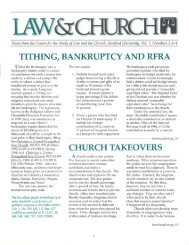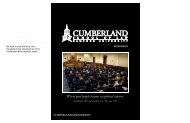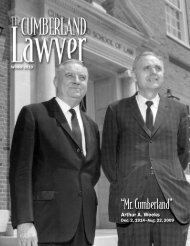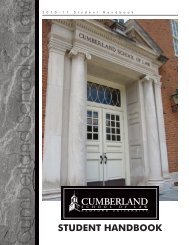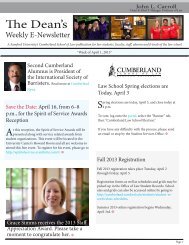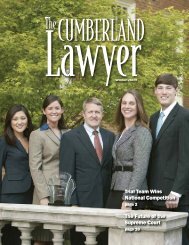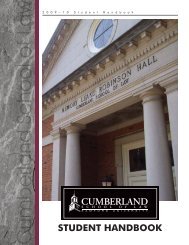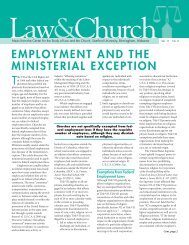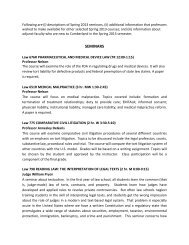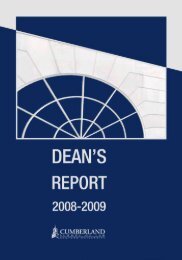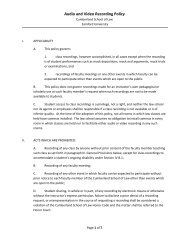the fair labor standards act and religious organizations
the fair labor standards act and religious organizations
the fair labor standards act and religious organizations
Create successful ePaper yourself
Turn your PDF publications into a flip-book with our unique Google optimized e-Paper software.
News from <strong>the</strong> Center for <strong>the</strong> Study of Law <strong>and</strong> <strong>the</strong> Church, Samford Universihj, Birmingham, Alabama<br />
Spring 1992<br />
THE FAIR LABOR STANDARDS ACT AND<br />
RELIGIOUS ORGANIZATIONS<br />
T he Fair Labor St<strong>and</strong>ards Act<br />
(Act), 29 U.s.c. § 201, passed in<br />
1938, sets general <strong>st<strong>and</strong>ards</strong> for<br />
minimum wages, overtime compensation,<br />
restricts <strong>the</strong> employment<br />
of underage children, <strong>and</strong><br />
provides for equal pay for equal<br />
work regardless of gender for<br />
covered employees. Covered<br />
employees include (1) employees<br />
engaged in interstate commerce,<br />
(2) employees engaged in <strong>the</strong> production<br />
of goods for commerce,<br />
<strong>and</strong> (3) employees employed in an<br />
enterprise engaged in commerce<br />
or in <strong>the</strong> production of goods for<br />
commerce. Employers who fail to<br />
follow <strong>the</strong> provisions of <strong>the</strong> Act<br />
may be liable for substantial fines<br />
<strong>and</strong> penalties. This article will discuss<br />
whe<strong>the</strong>r churches <strong>and</strong> <strong>the</strong>ir<br />
employees fall under <strong>the</strong> provisions<br />
of <strong>the</strong> Act <strong>and</strong> any exemptions<br />
that might apply.<br />
The Act was initially passed to<br />
protect employees engaged in<br />
interstate commerce from subst<strong>and</strong>ard<br />
wages <strong>and</strong> excessive<br />
working hours. The Act accomplishes<br />
some of its goals by prescribing<br />
a maximum workweek of<br />
40 hours for covered employees,<br />
<strong>and</strong> requires <strong>the</strong> payment of overtime<br />
at a rate of one-<strong>and</strong>-one-half<br />
times (or time-<strong>and</strong>-a-half) of <strong>the</strong><br />
employee's regular rate of pay for<br />
all hours worked in excess of 40<br />
per week. The Act also prescribes a<br />
minimum wage for all covered<br />
employees. The hourly minimum<br />
wage is <strong>the</strong> amount Congress has<br />
determined is necessary to sustain<br />
a minimum st<strong>and</strong>ard of living. The<br />
minimum wage currently is $4.25<br />
per hour. The Act does not establish<br />
a daily maximum hours limit,<br />
after which overtime would be<br />
required. Overtime would need to<br />
be paid over to <strong>the</strong> employee only<br />
on <strong>the</strong> regular payday for <strong>the</strong><br />
workweeks in question.<br />
In order for a worker to be entitled to<br />
<strong>the</strong> minimum wage <strong>and</strong> overtime compensation<br />
provisions of <strong>the</strong> Act, first he<br />
or she must be an "employee."<br />
The Act defines an employee as<br />
"any individual employed by an<br />
employer" <strong>and</strong> states that<br />
"employ" means a person is "suffered<br />
or permitted" to work. [d. at<br />
203(e) & (g). Volunteers <strong>and</strong> selfemployed<br />
persons are not considered<br />
employees <strong>and</strong> so are not<br />
entitled to <strong>the</strong> minimum wage or<br />
overtime pay.<br />
Although <strong>the</strong> Act originally<br />
covered only those employees<br />
"engaged in commerce or in <strong>the</strong><br />
production of goods for commerce"<br />
(commerce including both<br />
incoming <strong>and</strong> outgoing foreign<br />
transportation of goods, as well as<br />
such trade between <strong>the</strong> states),<br />
Congress exp<strong>and</strong>ed <strong>the</strong> Act's<br />
coverage in 1961 by amending <strong>the</strong><br />
Act to cover "enterprises" as well<br />
as individual employees. The Act<br />
now provides that employers must<br />
pay <strong>the</strong> minimum wage <strong>and</strong> overtime<br />
compensation not only to<br />
employees <strong>act</strong>ually engaged in<br />
commerce or in <strong>the</strong> production<br />
(continued 011 pg. 2)<br />
ARE CHURCHES EXEMPT<br />
FROM THE DISABILITIES ACT?<br />
T he Americans with Disabilities<br />
Act (ADA) of 1990 was passed to<br />
establish a uniform, national program<br />
to protect <strong>the</strong> disabled from<br />
discrimination <strong>and</strong> to make public<br />
structures accessible to <strong>the</strong> disabled.<br />
42 U.s.c. § 12101. The law<br />
prohibits discrimination against<br />
persons with physical <strong>and</strong> mental<br />
disabilities in public accommodations,<br />
state <strong>and</strong> local government<br />
services, private <strong>and</strong> public transportation,<br />
private-sector employment,<br />
<strong>and</strong> telecommunications services.<br />
While churches <strong>and</strong> o<strong>the</strong>r<br />
<strong>religious</strong> <strong>organizations</strong> are exempt<br />
from most provisions of <strong>the</strong> law,<br />
<strong>the</strong>re are some significant require-<br />
ments that do apply to churches<br />
<strong>and</strong> <strong>religious</strong> <strong>organizations</strong>.<br />
Public Accommodations<br />
<strong>and</strong> Transportation<br />
The ADA includes a list of private<br />
entities that are considered<br />
"public accommodations" for purposes<br />
of <strong>the</strong> ADA <strong>and</strong> so must<br />
conform to <strong>the</strong> law's requirements.<br />
Places such as restaurants,libraries,<br />
law offices, day care centers,<br />
homeless shelters, <strong>and</strong> food banks,<br />
among o<strong>the</strong>rs, are considered public<br />
accommodations for purposes<br />
of <strong>the</strong> law. [d. at 12181(7). Public<br />
accommodations must make <strong>the</strong>ir<br />
(conHnued on pg.4)
(Fair Labor St<strong>and</strong>ards Act cont'd)<br />
of goods for commerce, but also to<br />
any employee in "an enterprise<br />
engaged in commerce or in <strong>the</strong><br />
production of goods for commerce."<br />
Id. at 203(s). Therefore, in<br />
order for'<strong>the</strong> minimum wage <strong>and</strong><br />
overtime compensation requirements<br />
to apply to a particular<br />
worker, <strong>the</strong> following two requirements<br />
must be met:<br />
(1) <strong>the</strong> worker must ei<strong>the</strong>r be<br />
(a) engaged directly in<br />
commerce or in <strong>the</strong><br />
production of goods for<br />
commerce,<br />
or<br />
(b) employed by an enterprise<br />
engaged in commerce<br />
or in <strong>the</strong> production<br />
of goods for<br />
commerce, <strong>and</strong><br />
(2) <strong>the</strong> worker must be an<br />
employee.<br />
The Act defines an 'enterprise'<br />
as "<strong>the</strong> related <strong>act</strong>ivities performed<br />
... by any person or persons for a<br />
common business purpose." Id. at<br />
203(r). Most <strong>religious</strong> <strong>and</strong> charitable<br />
<strong>organizations</strong> will be excluded<br />
from this definition of <strong>the</strong> Act so<br />
long as <strong>the</strong>y are not operating for<br />
profit <strong>and</strong> are not pursuing a business<br />
purpose. If, however, <strong>the</strong><br />
organization is engaged in commercial<br />
or business <strong>act</strong>ivities, it<br />
will be deemed to be an 'enterprise'<br />
<strong>and</strong> subject to <strong>the</strong> minimum<br />
wage <strong>and</strong> overtime compensation<br />
requirements. The United States<br />
Supreme Court noted that "[tlhe<br />
Act reaches ... <strong>the</strong> 'ordinary commercial<br />
<strong>act</strong>ivities' of <strong>religious</strong><br />
<strong>organizations</strong>." Tony & Susan<br />
Alamo Foundation v. Secretary of<br />
Labor, 471 U.S. 290, 302 (1985).<br />
Congress, however, fur<strong>the</strong>r<br />
amended <strong>the</strong> Act in 1966 to<br />
include within <strong>the</strong> definition of<br />
'enterprise' any "preschool, elementary<br />
or secondary school, or<br />
an institution of higher education<br />
(regardless of whe<strong>the</strong>r or not such<br />
... institution, or school is public<br />
or private or operated for profit or<br />
not for profit)". 29 U.S.c. § 203(r).<br />
Th is provision has been interpreted to<br />
provide that schools <strong>and</strong> preschools,<br />
even those operated by churches, are<br />
regarded to be <strong>act</strong>ivities performed for a<br />
common business purpose. Also, <strong>the</strong><br />
tenn 'preschool' has been defined to<br />
include a church-operated child care<br />
facility even if <strong>the</strong> faci lity is primarily a<br />
custodial, ra<strong>the</strong>r than an educational,<br />
institution. Department of Labor, Publication<br />
1364.<br />
Once a church school or preschool<br />
is deemed to be an 'enterprise',<br />
it must also be 'engaged in<br />
commerce or in <strong>the</strong> production of<br />
goods for commerce', <strong>and</strong> <strong>the</strong><br />
worker must be an employee. An<br />
enterprise engaged in commerce<br />
or in <strong>the</strong> production of goods for<br />
commerce is defined by<br />
<strong>the</strong> Act as an enterprise that:<br />
(1) "has employees engaged in<br />
commerce or in <strong>the</strong> production<br />
of goods for commerce,<br />
or that has<br />
employees h<strong>and</strong>ling, selling,<br />
or o<strong>the</strong>rwise working<br />
on goods or materials that<br />
have been moved in or<br />
produced for commerce by<br />
any person; <strong>and</strong> is an<br />
enterprise whose annual<br />
gross volume of sales made<br />
or business done is not less<br />
than $500,000"; or<br />
(2) is engaged in <strong>the</strong> operation<br />
of a ... preschool, elementary<br />
or secondary school,<br />
or an institution of higher<br />
education (regardless of<br />
whe<strong>the</strong>r or not such ...<br />
institution or school is<br />
public or private or operated<br />
for profit or not for<br />
profit)." 29 U.s.c. §<br />
203(s)(I).<br />
Therefore, according to section<br />
203(s) of <strong>the</strong> Act, church-operated<br />
schools <strong>and</strong> preschools are<br />
deemed to be 'enterprises engaged<br />
in commerce or in <strong>the</strong> production<br />
of goods for commerce'.<br />
Only those church employees who<br />
work in <strong>the</strong> school or preschool are<br />
covered by <strong>the</strong> Act. O<strong>the</strong>r church<br />
members, unless <strong>the</strong>y are involved in<br />
commercial <strong>act</strong>ivities that gross over<br />
$500,000 per year, will not be covered.<br />
In Tony & Susan Alamo Foundation<br />
v. Secretary of Labor, 471<br />
2<br />
U.S. 290, 302 (1985), <strong>the</strong> u.s.<br />
Supreme Court said <strong>the</strong> Act applied<br />
to "associates" who performed<br />
commercial work for a <strong>religious</strong><br />
organization in exchange for<br />
food <strong>and</strong> boarding. The foundation<br />
was involved in various commercial<br />
enterprises, such as restaurants<br />
<strong>and</strong> construction, <strong>and</strong> <strong>the</strong><br />
associates who performed <strong>the</strong><br />
work were former drug addicts<br />
<strong>and</strong> criminals who had been evangelized<br />
by <strong>the</strong> foundation. The<br />
Court, in finding that <strong>the</strong> foundation's<br />
commercial <strong>act</strong>ivities were<br />
an enterprise engaged in commerce,<br />
said "[tlhe statute contains<br />
no express or implied exception<br />
for commercial <strong>act</strong>ivities conducted<br />
by <strong>religious</strong> or o<strong>the</strong>r nonprofit<br />
<strong>organizations</strong>, <strong>and</strong> <strong>the</strong><br />
agency charged with its enforcement<br />
has consistently interpreted<br />
<strong>the</strong> statute to reach such businesses."<br />
Id. at 296.<br />
The Court also said that <strong>the</strong><br />
foundation's "associates" were not<br />
volunteers but employees. The<br />
Court noted that <strong>the</strong> Act defined<br />
wages to include in-kind benefits,<br />
or benefits that are <strong>the</strong> equivalent<br />
of regular wages such as food <strong>and</strong><br />
lodging, <strong>and</strong> so <strong>the</strong> associates were<br />
<strong>act</strong>ually compensated employees<br />
under <strong>the</strong> Act. The justices noted<br />
that <strong>the</strong> test of employment under<br />
<strong>the</strong> Act is one of "economic reality"<br />
<strong>and</strong> compensation received<br />
primarily in <strong>the</strong> form of benefits<br />
are wages in ano<strong>the</strong>r form. Id. at<br />
301. The foundation was required<br />
to pay <strong>the</strong> "associates" <strong>the</strong> minimum<br />
wage <strong>and</strong> overtime<br />
compensation.<br />
Exemptions Under <strong>the</strong> Act<br />
Churches <strong>and</strong> o<strong>the</strong>r <strong>religious</strong><br />
<strong>organizations</strong> should be aware of<br />
exemptions for certain workers<br />
who are not subject to <strong>the</strong> minimum<br />
wage <strong>and</strong> overtime compensation<br />
requirements. First, <strong>the</strong> Act<br />
grants a limited exemption for<br />
employees of a <strong>religious</strong> or nonprofit<br />
educational conference center<br />
if <strong>the</strong> center does not operate<br />
for more than seven months in<br />
any calendar year, or if during <strong>the</strong><br />
preceding calendar year its average<br />
receipts for any six months
(Fair Labor St<strong>and</strong>ards Act cont'd)<br />
were not more than one-third of<br />
its average receipts for <strong>the</strong> o<strong>the</strong>r<br />
six months of <strong>the</strong> year. 26 U.s.c. §<br />
213(a)(3).<br />
Second, <strong>the</strong> Act exempts "any<br />
employee employed in a bona fide<br />
executive, administrative, or professional<br />
capacity (including any<br />
employee employed in <strong>the</strong> capacity<br />
of academic administrative personnel<br />
or teacher in elementary or<br />
secondary schools.)." Id. at<br />
213(a)(1). The Department of Labor<br />
has defined <strong>the</strong> various job<br />
requirements for each of <strong>the</strong> foregoing<br />
categories <strong>and</strong> what is<br />
required for a person to be exempt<br />
from <strong>the</strong> minimum wage <strong>and</strong> overtime<br />
compensation requirements.<br />
An employee of a church or o<strong>the</strong>r<br />
<strong>religious</strong> organization who is<br />
employed in a bona fide executive,<br />
administrative, or professional<br />
capacity will be exempt from <strong>the</strong><br />
Act's requirements.<br />
Executive employees are defined<br />
as any employee (1) whose primary<br />
duty is <strong>the</strong> management of<br />
(a) <strong>the</strong> enterprise in which he is<br />
employed or (b) a customarily recognized<br />
department or subdivision<br />
of <strong>the</strong> enterprise, (2) supervises <strong>the</strong><br />
work of two or more full-time<br />
employees, (3) has authority to<br />
hire, discharge, or promote o<strong>the</strong>r<br />
employees, (4) exercises discretionary<br />
powers, (5) spends at least 80<br />
percent of <strong>the</strong> workday engaged in<br />
<strong>the</strong> primary duty, <strong>and</strong> (6) is paid<br />
on a salary basis of not less than<br />
$130 per week. 29 C.F.R. § 541.101.<br />
Administrative employees are<br />
defined as any employee (1) who<br />
performs office or non manual<br />
work directly related to management<br />
operations, or administrative<br />
duties in a school system, (2) regularly<br />
exercises discretion beyond<br />
clerical duties, (3) performs specialized<br />
or technical work, or special<br />
assignments with only general<br />
supervision, (4) spends at least 80<br />
percent of work time on such<br />
work, <strong>and</strong> (5) is paid on a salary<br />
basis of not less than $130 per<br />
week. 29 C.F.R. § 541.201.<br />
Professional employees are<br />
defined as any employee (1) who<br />
is required to have as his primary<br />
duty, work that ei<strong>the</strong>r (a) requires<br />
advanced knowledge in a field of<br />
science or learning, of a type customarily<br />
acquired by a prolonged<br />
course of specialized study, (b)<br />
work that is original <strong>and</strong> creative<br />
in char<strong>act</strong>er in a recognized field of<br />
artistic endeavor, <strong>and</strong> is primarily<br />
based on <strong>the</strong> employee's invention,<br />
imagination, or talent, or (c)<br />
teaching, tutoring, instructing, or<br />
lecturing as a teacher in a school<br />
system, (2) who exercises discretion<br />
<strong>and</strong> judgment, (3) whose work<br />
is predominantly intellectual <strong>and</strong><br />
varied in char<strong>act</strong>er, (4) devotes 80<br />
percent or more of his hours to <strong>the</strong><br />
<strong>act</strong>ivities previously mentioned,<br />
<strong>and</strong> (5) is paid on a salary or fee<br />
basis of not less than $150 per<br />
week (this requirement does not<br />
apply to teachers). 29 C.F.R. §<br />
541.301.<br />
Clergy are included in <strong>the</strong> list of profes<br />
sional employees. [d. at 541.301.<br />
The Department of Labor has<br />
also issued Publication 1364 which<br />
states <strong>the</strong> following:<br />
While preschools engage in<br />
some educational <strong>act</strong>ivities for<br />
<strong>the</strong> children, employees whose<br />
primary duty is to care for <strong>the</strong><br />
physical needs of <strong>the</strong> children<br />
would not ordinarily meet <strong>the</strong><br />
requirements for exemption as<br />
teachers. This is true even<br />
though <strong>the</strong> term "kindergarten"<br />
may be applied to <strong>the</strong> ordinary<br />
day care center. However, bona<br />
fide teachers in a kindergarten<br />
which is part of an elementary<br />
school system are still con sid -<br />
ered exempt under <strong>the</strong> same<br />
conditions as a teacher in an elementary<br />
school.<br />
Therefore, if a church operates a<br />
school, <strong>the</strong> teachers would be<br />
exempt from <strong>the</strong> Act while o<strong>the</strong>r<br />
school employees, such as custodians<br />
<strong>and</strong> cafeteria workers, would<br />
be subject to <strong>the</strong> Act's minimum<br />
wage <strong>and</strong> overtime compensations<br />
provisions.<br />
Constitutionality of Act As<br />
Applied to Churches<br />
In Dole v. Shen<strong>and</strong>oah Baptist<br />
Church, 899 F.2d 1389 (4th Cir.<br />
1990) cert denied 111 S.C!. 131<br />
3<br />
(1990), <strong>the</strong> court held <strong>the</strong> Fair<br />
Labor St<strong>and</strong>ards Act applied to<br />
church-operated schools <strong>and</strong><br />
employees. Shen<strong>and</strong>oah Baptist<br />
Church is an independent Baptist<br />
church which believes in <strong>the</strong> absolut.e<br />
authority of <strong>the</strong> Bible. Shen<strong>and</strong>oah<br />
opened Roanoke Valley<br />
school offering traditional academic<br />
subjects into which biblical<br />
material had been integrated <strong>and</strong><br />
eventually offered classes from<br />
kindergarten through high school.<br />
Roanoke Valley school teachers<br />
received a low base salary. Because<br />
<strong>the</strong> low salary level made it difficult<br />
to attr<strong>act</strong> teachers, <strong>the</strong> school<br />
instituted a head-of-household<br />
salary supplement. The church<br />
interpreted <strong>the</strong> Bible to teach that<br />
<strong>the</strong> husb<strong>and</strong> is <strong>the</strong> head of household.<br />
Married male teachers<br />
received <strong>the</strong> salary supplement<br />
while married women were not<br />
eligible to receive <strong>the</strong> supplement,<br />
even though <strong>the</strong>y were <strong>the</strong> sole<br />
working parent <strong>and</strong> had dependents.<br />
Roanoke Valley also had support<br />
personnel, such as custodians<br />
<strong>and</strong> lunchroom workers, who were<br />
paid less than <strong>the</strong> hourly minimum<br />
wage.<br />
The court had to decide (1)<br />
whe<strong>the</strong>r a church-operated school<br />
is an "enterprise" for purposes of<br />
<strong>the</strong> Act, (2) whe<strong>the</strong>r individuals<br />
who work in such a school are<br />
'employees' under <strong>the</strong> Act, <strong>and</strong> (3)<br />
whe<strong>the</strong>r <strong>the</strong> First Amendment precluded<br />
Act coverage of such a<br />
school. The court held <strong>the</strong> Act did<br />
apply to <strong>the</strong> school. The court<br />
looked at both <strong>the</strong> Act's definition<br />
of "enterprise" <strong>and</strong> <strong>the</strong> legislative<br />
history of <strong>the</strong> Act <strong>and</strong> concluded<br />
that church-operated schools are<br />
encompassed within <strong>the</strong> Act's definition<br />
of an enterprise.<br />
The court also rejected <strong>the</strong><br />
church's claim that <strong>the</strong> individuals<br />
who worked for <strong>the</strong> school fell<br />
under <strong>the</strong> Act's exemption for<br />
ministerial employees. The court<br />
noted that <strong>the</strong> teachers performed<br />
no "sacerdotal" function, did not<br />
serve as church governors, <strong>and</strong> did<br />
not belong to any clearly delineated<br />
<strong>religious</strong> orders.<br />
The judges also noted that <strong>the</strong><br />
Supreme Court had explained that <strong>the</strong>
(Fair Labor St<strong>and</strong>ards Act conl'd)<br />
test of employment under <strong>the</strong> Act was one<br />
of "economic reality" alld that <strong>the</strong> eco-<br />
1I0mic reality in <strong>the</strong> present case was that<br />
<strong>the</strong> Roanoke Valley teachers were<br />
employed as lay teachers ill a churchoperated<br />
private school.<br />
Finally, <strong>the</strong> court held that <strong>the</strong> Act<br />
did not impermissibly burden <strong>the</strong><br />
church members' exercise of religion<br />
under <strong>the</strong> First Amendment. Church<br />
members testified that <strong>the</strong> Bible<br />
does not m<strong>and</strong>ate a pay differential<br />
based on sex <strong>and</strong> that no church<br />
doctrine prevented <strong>the</strong> school from<br />
paying women as much as men or<br />
from paying <strong>the</strong> minimum wage.<br />
The court concluded that <strong>the</strong>re<br />
could be no way to exempt <strong>the</strong><br />
school without exempting all o<strong>the</strong>r<br />
sectarian schools <strong>and</strong> employees<br />
from <strong>the</strong> Act. This would undermine<br />
<strong>the</strong> congressional goal of making<br />
minimum wage <strong>and</strong> equal pay<br />
(Disabilities Act .. . can I'd from pg. 1)<br />
buildings <strong>and</strong> o<strong>the</strong>r structures<br />
accessible to <strong>the</strong> disabled. This could<br />
include such things as removing<br />
obstacles to doorways, pathways,<br />
rest rooms, water fountains <strong>and</strong> conference<br />
rooms, widening hallways<br />
<strong>and</strong> erecting ramps for wheelchairs,<br />
<strong>and</strong> installing flashing alarm lights.<br />
Churches, however, are exempt<br />
from having to make <strong>the</strong>ir public<br />
facilities physically accessible to <strong>the</strong><br />
disabled. Section 12187 of <strong>the</strong> ADA<br />
states that <strong>religious</strong> <strong>organizations</strong> or<br />
entities controlled by a <strong>religious</strong><br />
organization, including places of<br />
worship, are exempt from <strong>the</strong> ADA's<br />
public accommodations definition.<br />
According to federal regulations, <strong>the</strong><br />
ADA's exemption of <strong>religious</strong> <strong>organizations</strong><br />
<strong>and</strong> <strong>religious</strong> entities controlled<br />
by <strong>religious</strong> <strong>organizations</strong> is<br />
very broad, encompassing a wide<br />
variety of situations.<br />
Religious <strong>organizations</strong> <strong>and</strong> entities<br />
controlled by <strong>religious</strong> <strong>organizations</strong><br />
have no obligations under <strong>the</strong><br />
ADA. Even when a <strong>religious</strong> organization<br />
carries out <strong>act</strong>ivities that<br />
would o<strong>the</strong>rwise make it a public<br />
accommodation, <strong>the</strong> <strong>religious</strong> organization<br />
is exempt from <strong>the</strong> ADA coverage.<br />
Thus, if a church itself operated<br />
a day care center, a nursing<br />
home, a private school, or a diocesan<br />
school system, <strong>the</strong> operations of<br />
requirements applicable to all<br />
schools <strong>and</strong> a less restrictive means<br />
was not available to attain Congress's<br />
goal to insure workers a minimum<br />
wage sufficient to maintain a<br />
minimum st<strong>and</strong>ard of living.<br />
The church was required to pay<br />
approximately $178,000 in back pay<br />
to female teachers who were subject<br />
to equal pay violations <strong>and</strong> about<br />
$17,000 to support staff members<br />
who were subject to minimum wage<br />
violations. This case demonstrates<br />
<strong>the</strong> importance of following <strong>the</strong><br />
wage <strong>and</strong> hour requirements when<br />
applicable.<br />
Compliance <strong>and</strong> Penalties<br />
All employers who have<br />
employees covered by <strong>the</strong> Act must<br />
maintain adequate records documenting<br />
all employees, hours<br />
worked, <strong>the</strong> wages received, <strong>and</strong><br />
such center, home, school, or<br />
schools would not be subject to <strong>the</strong><br />
requirements of <strong>the</strong> ADA. Also, <strong>the</strong><br />
<strong>religious</strong> entity would not lose its<br />
exemption merely because <strong>the</strong> services<br />
provided were open to <strong>the</strong><br />
general public. The test is whe<strong>the</strong>r<br />
<strong>the</strong> church or o<strong>the</strong>r <strong>religious</strong> organization<br />
operated <strong>the</strong> public accommodation,<br />
not which individuals<br />
receive <strong>the</strong> public accommodation's<br />
services. 56 Fed. Reg. 35,544 (1991).<br />
Religious entities that are controlled<br />
by <strong>religious</strong> <strong>organizations</strong> are<br />
also exempt from <strong>the</strong> ADA's requirements.<br />
Many <strong>religious</strong> <strong>organizations</strong><br />
use lay boards <strong>and</strong> o<strong>the</strong>r secular or<br />
corporate mechanisms to operate<br />
schools <strong>and</strong> an array of social services.<br />
The use of a lay board or o<strong>the</strong>r<br />
mechanism does not itself remove<br />
<strong>the</strong> ADA's <strong>religious</strong> exemption.<br />
Thus, a parochial school, having <strong>religious</strong><br />
doctrine in its curriculum <strong>and</strong><br />
sponsored by a <strong>religious</strong> order,<br />
could be exempt ei<strong>the</strong>r as a <strong>religious</strong><br />
organization or as an entity controlled<br />
by a <strong>religious</strong> organization,<br />
even if it has a lay board. The test<br />
remains a f<strong>act</strong>ual one - whe<strong>the</strong>r <strong>the</strong><br />
church or o<strong>the</strong>r <strong>religious</strong> organization<br />
controls <strong>the</strong> operations of <strong>the</strong><br />
school or of <strong>the</strong> service or whe<strong>the</strong>r<br />
<strong>the</strong> school or service is itself a <strong>religious</strong><br />
organization. Id.<br />
4<br />
o<strong>the</strong>r terms <strong>and</strong> conditions of<br />
employment.<br />
Also, penalties may be imposed for violations<br />
of <strong>the</strong> Act.<br />
Employers who violate <strong>the</strong> Act are<br />
liable to <strong>the</strong>ir employees for <strong>the</strong><br />
amount of <strong>the</strong> unpaid minimum<br />
wage or <strong>the</strong> unpaid overtime pay<br />
<strong>and</strong> an equal additional amount for<br />
liquidated damages. Employees can<br />
also collect <strong>the</strong> reasonable cost of<br />
<strong>the</strong>ir attorney's fees <strong>and</strong> court costs<br />
in suing <strong>the</strong> employer. Employers<br />
who willfully violate <strong>the</strong> minimum<br />
wage or overtime pay requirements<br />
of <strong>the</strong> Act are subject to a fine of up<br />
to $10,000 for each violation. A 2year<br />
statute of limitations applies to<br />
<strong>the</strong> recovery of back wages except in<br />
<strong>the</strong> case of willful violations, in<br />
which case a 3-year statute of limitations<br />
applies. 26 U.S.c. § 216. n<br />
Although a <strong>religious</strong> organization or a<br />
<strong>religious</strong> entihj that is controlled by a <strong>religious</strong><br />
orgallizatioll has no obligations<br />
under <strong>the</strong> rule, a "pulllic accommodation"<br />
that is Ilot itself a <strong>religious</strong> organization<br />
but that operates a place of public accommodation<br />
in leased space on <strong>the</strong> property<br />
of a <strong>religious</strong> entity, which is not a place<br />
of worship, will be subject to <strong>the</strong> rule's<br />
requirements if it is not under <strong>the</strong> control<br />
of <strong>the</strong> <strong>religious</strong> orgallization.<br />
For example, if a church rents<br />
meeting space, which is not a place<br />
of worship, to a local community<br />
group or to a private, independent<br />
day care center, <strong>the</strong> ADA applies to<br />
<strong>the</strong> <strong>act</strong>ivities of <strong>the</strong> local community<br />
group <strong>and</strong> <strong>the</strong> day care center if a<br />
lease exists <strong>and</strong> consideration is<br />
paid. Id.<br />
The Department of Transportation<br />
has also stipulated in its regulations<br />
that <strong>the</strong> transportation provisions of<br />
<strong>the</strong> ADA do not apply to <strong>religious</strong><br />
<strong>organizations</strong>. Church buses <strong>and</strong><br />
shuttle services will not have to<br />
comply with <strong>the</strong> public transportation<br />
provisions of <strong>the</strong> ADA, such as<br />
providing wheelchair lifts in church<br />
vehicles. 56 Fed. Reg. 45,584 (1991).<br />
Employment Requirements<br />
Larger churches, however, will<br />
come under <strong>the</strong> employment section
Crowley v. Tilton, <strong>and</strong> Word of<br />
Faith World Outreach Center<br />
Church, No. 92C-169E (D.Okl. filed<br />
Feb. 1992).<br />
B everly Crowley has sued televangelist<br />
Robert Tilton <strong>and</strong> his<br />
Word of Faith World Outreach<br />
Center Church, contending fraud<br />
<strong>and</strong> deceit. Five months after Mrs.<br />
Crowley's husb<strong>and</strong> died of kidney<br />
failure, she was still receiving mail<br />
from <strong>the</strong> televangelist addressed to<br />
her deceased husb<strong>and</strong>; one of <strong>the</strong><br />
(Disabilities Act ... cont'd)<br />
of <strong>the</strong> ADA, which prohibits discrimination<br />
in hiring on <strong>the</strong> basis<br />
of a disability. The law still recognizes,<br />
however, <strong>the</strong> right of<br />
churches <strong>and</strong> o<strong>the</strong>r <strong>religious</strong><br />
<strong>organizations</strong> to choose employment<br />
c<strong>and</strong>idates that subscribe to<br />
<strong>the</strong> same faith as <strong>the</strong> organization.<br />
The law states a <strong>religious</strong> corporation,<br />
association, educational institution,<br />
or society is permitted to<br />
give preference in employment to<br />
individuals of a particular religion<br />
to perform work connected with<br />
<strong>the</strong> carrying on by that corporation,<br />
association, educational institution,<br />
or society of its <strong>act</strong>ivities. A<br />
religiOUS entity may require that<br />
all applicants <strong>and</strong> employees conform<br />
to <strong>the</strong> <strong>religious</strong> tenets of such<br />
organization. U.S.c. § 12113(c).<br />
However, a <strong>religious</strong> entity may<br />
not discriminate against a qualified<br />
individual, who satisfies <strong>the</strong> permitted<br />
religiOUS criteria, because of<br />
his or her disability. 56 Fed. Reg.<br />
35,726 (1991).<br />
Headnotes<br />
letters from Tilton said, "God<br />
spoke to me this morning specifically<br />
about you, Tom, <strong>and</strong> He's<br />
going to heal you." Mrs. Crowley<br />
asserted that <strong>the</strong> solicitations to<br />
her deceased husb<strong>and</strong> stated that<br />
God wanted to restore Crowley'S<br />
health <strong>and</strong> that all this would<br />
occur if money was sent to Tilton.<br />
Mr. Crowley died in September<br />
1991. In January 1992, Mrs. Crowley<br />
wrote Tilton a letter informing<br />
him of her husb<strong>and</strong>'s death <strong>and</strong><br />
asking him to stop sending<br />
A church that is not required to<br />
become physically accessible to <strong>the</strong> public<br />
may still need to make structural<br />
changes in order to become accessible to<br />
employees with disabilities.<br />
Beginning in July 1992, churches<br />
<strong>and</strong> o<strong>the</strong>r <strong>religious</strong> <strong>organizations</strong><br />
will be required to make reasonable<br />
accommodations for all disabled<br />
employees if <strong>the</strong>y have 25 or<br />
more workers for 20 or more<br />
weeks a year between July 29, 1992<br />
<strong>and</strong> July 29, 1994. Beginning in<br />
1994, <strong>religious</strong> groups will have to<br />
comply with accommodation<br />
requirements if <strong>the</strong>y employ 15 or<br />
more persons for 20 or more weeks<br />
a year. 56 Fed. Reg. 35,726. The<br />
Equal Employment Opportunity<br />
Commission (EEOC) will be<br />
responsible for enforcing <strong>the</strong><br />
employment provisions of <strong>the</strong><br />
ADA.<br />
Although most provisions of <strong>the</strong><br />
ADA do not apply to churches <strong>and</strong><br />
o<strong>the</strong>r <strong>religious</strong> <strong>organizations</strong>, <strong>the</strong>se<br />
requests for donations to his ministry.<br />
The solicitation letters, however,<br />
continued. Mrs. Crowley said<br />
she has sued Tilton because she<br />
cannot make <strong>the</strong> solicitations stop.<br />
Mrs. Crowley is asking for $40 million<br />
in damages. She alleges that<br />
Tilton's letters addressed to her<br />
late husb<strong>and</strong> have caused her to<br />
suffer anguish, shock, nervousness<br />
<strong>and</strong> anxiety. II<br />
groups could be more aware <strong>and</strong><br />
sensitive to <strong>the</strong> needs of those<br />
with h<strong>and</strong>icaps. Some church leaders<br />
are prone to say <strong>the</strong>ir churches<br />
do not have any h<strong>and</strong>icapped<br />
members in <strong>the</strong>ir congregations, so<br />
<strong>the</strong>y do not have any problems<br />
with accessibility. What <strong>the</strong>y may<br />
be blind to is that <strong>the</strong> accessibility<br />
problem may be <strong>the</strong> very reason<br />
<strong>the</strong>y do not have disabled people<br />
in <strong>the</strong>ir churches. The ADA<br />
requirements could serve as useful<br />
guidelines for churches <strong>and</strong> o<strong>the</strong>r<br />
exempt <strong>organizations</strong> on how to<br />
make <strong>the</strong>ir facilities more accessible<br />
to <strong>the</strong> disabled. Churches<br />
should evaluate <strong>the</strong> intent of <strong>the</strong><br />
legislation in terms of <strong>the</strong> church's<br />
witnessing.<br />
Because <strong>the</strong> ADA legislation is<br />
new <strong>and</strong> has not been interpreted<br />
by any court, churches should<br />
keep current on <strong>the</strong> ADA for any<br />
possible new interpretations of <strong>the</strong><br />
Act that may have an imp<strong>act</strong> on<br />
churches. n<br />
The next issue of LAW & CHURCH (Summer 1992)<br />
will have an article dealing with <strong>the</strong> illness of<br />
AIDS in <strong>the</strong> content of <strong>the</strong> church.<br />
5
LAW &CHURCH<br />
Published by <strong>the</strong> Center for <strong>the</strong> Study<br />
of Law <strong>and</strong> <strong>the</strong> Church,<br />
Cumberl<strong>and</strong> School of Law,<br />
Samford University<br />
S. U. Box 2304<br />
Birmingham, AL 35229<br />
Telephone - Local: 205/870-2409<br />
Toll Free Number: 1-800-888-7303<br />
Published Quarterly - Winter, Spring,<br />
Summer, <strong>and</strong> Fall of each year.<br />
Subscription: $ 10.00 annually.<br />
Copyright 1992<br />
CENTER FOR THE STUDY OF LAW & THE CHURCH, SAMFORD UNIVERSITY<br />
Chriss H. Doss, Director<br />
Unda L. Dukes, Staff Attorney<br />
This publication is designed to provide information in regard to <strong>the</strong> subject matter covered. It is sold with <strong>the</strong> underst<strong>and</strong>ing<br />
that legal advice is not being rendered. If legal advice is required, <strong>the</strong> services of a competent attorney should be sought.<br />
Samford University is an Equal Opportunity Institution <strong>and</strong> welcomes applications for employment <strong>and</strong> educational programs<br />
from all individuals regardless of race, color, sex, h<strong>and</strong>icap, or national or ethnic origin.<br />
CENTER FOR THE STUDY OF LAW & THE CHURCH<br />
Cumberl<strong>and</strong> School of Law - Samford University<br />
S.U. Box 2304<br />
Birmingham, Alabama 35229<br />
The Center for <strong>the</strong> Study of Law <strong>and</strong> <strong>the</strong> Church<br />
Cumberl<strong>and</strong> School of Law - Samford University<br />
S. U. Box 2304, Birmingham, AL 35229, Telephone: 205/870-2409<br />
Annual Subscription to "LAW & CHURCH" is $10.00 __ _<br />
Please find enclosed a check in <strong>the</strong> amount of $ ___ _<br />
for annual subscription(s) of recipient listed below:<br />
Non-Profit<br />
Organization<br />
U.S. POSTAGE<br />
PAID<br />
Pennit 1083<br />
Birmingham, A la.<br />
Name: ____________________________________________________________________________ ___<br />
Address: _____________________________________ _<br />
Telephone: (B) _____________ (H) _________________ _



